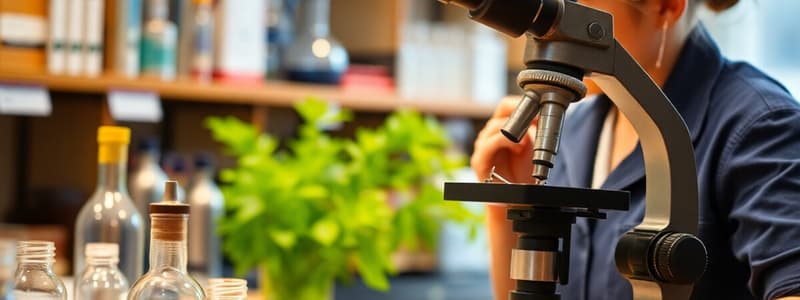Podcast
Questions and Answers
Which characteristic is essential for a valid scientific hypothesis?
Which characteristic is essential for a valid scientific hypothesis?
- It must be universally accepted by all scientists.
- It must be complex and difficult to understand.
- It must be based on qualitative observations only.
- It must be falsifiable through experimentation or observation. (correct)
A researcher observes that plants grow taller with increased sunlight. Which of the following is the most appropriate next step in the scientific method?
A researcher observes that plants grow taller with increased sunlight. Which of the following is the most appropriate next step in the scientific method?
- Formulate a hypothesis about the relationship between sunlight and plant growth. (correct)
- Immediately publish the observation in a scientific journal.
- Conclude that sunlight is essential for all plant growth.
- Ignore the observation as it is already common knowledge.
In an experiment testing the effect of fertilizer concentration on plant yield, what is the independent variable?
In an experiment testing the effect of fertilizer concentration on plant yield, what is the independent variable?
- The amount of water given to the plants.
- The type of plant used in the experiment.
- The concentration of fertilizer. (correct)
- The measured plant yield.
A scientist is analyzing data from an experiment and notices that the results contradict the initial hypothesis. What is the most appropriate course of action?
A scientist is analyzing data from an experiment and notices that the results contradict the initial hypothesis. What is the most appropriate course of action?
Which branch of natural science includes the study of chemical bonding and reaction mechanisms?
Which branch of natural science includes the study of chemical bonding and reaction mechanisms?
Which field of physics is most directly involved in the design of energy-efficient buildings and solar panels?
Which field of physics is most directly involved in the design of energy-efficient buildings and solar panels?
Ecologists are studying the interactions between different species in a forest ecosystem. Which branch of science is most relevant to their work?
Ecologists are studying the interactions between different species in a forest ecosystem. Which branch of science is most relevant to their work?
A volcanologist is studying the formation and eruption patterns of volcanoes. Which main branch of natural science does this fall under?
A volcanologist is studying the formation and eruption patterns of volcanoes. Which main branch of natural science does this fall under?
Which of the following scenarios best illustrates the application of a scientific theory?
Which of the following scenarios best illustrates the application of a scientific theory?
In the context of scientific investigation, what is the primary distinction between a scientific law and a scientific theory?
In the context of scientific investigation, what is the primary distinction between a scientific law and a scientific theory?
A researcher is studying the effect of fertilizer on plant growth. Which of the following units would be most appropriate for measuring the mass of fertilizer applied to each plant?
A researcher is studying the effect of fertilizer on plant growth. Which of the following units would be most appropriate for measuring the mass of fertilizer applied to each plant?
A car accelerates from rest to a velocity of 25 m/s in 5 seconds. Which SI derived unit would be used to express the car's acceleration?
A car accelerates from rest to a velocity of 25 m/s in 5 seconds. Which SI derived unit would be used to express the car's acceleration?
Which of the technological advancements has significantly improved global communication and information sharing?
Which of the technological advancements has significantly improved global communication and information sharing?
What role does science play in addressing the challenge of climate change?
What role does science play in addressing the challenge of climate change?
Why is scientific literacy important for the general public?
Why is scientific literacy important for the general public?
What does critical thinking involve when evaluating scientific information?
What does critical thinking involve when evaluating scientific information?
In a study examining the relationship between education level and income, which social science discipline is most directly involved?
In a study examining the relationship between education level and income, which social science discipline is most directly involved?
A computer programmer is tasked with creating an algorithm to sort a large dataset efficiently. Which field of formal science is most relevant to this task?
A computer programmer is tasked with creating an algorithm to sort a large dataset efficiently. Which field of formal science is most relevant to this task?
Flashcards
What is Science?
What is Science?
A systematic approach to understanding the natural world through observation, experimentation, and analysis.
Scientific Method
Scientific Method
A process used to investigate phenomena, acquire new knowledge, or correct previous knowledge, relying on evidence and logic.
Observation (Science)
Observation (Science)
The initial step in the scientific method that involves noticing and describing events or phenomena, either qualitatively or quantitatively.
Hypothesis
Hypothesis
Signup and view all the flashcards
Prediction (Science)
Prediction (Science)
Signup and view all the flashcards
Experiment (Science)
Experiment (Science)
Signup and view all the flashcards
Branches of Science
Branches of Science
Signup and view all the flashcards
Natural Sciences
Natural Sciences
Signup and view all the flashcards
Geology
Geology
Signup and view all the flashcards
Meteorology
Meteorology
Signup and view all the flashcards
Oceanography
Oceanography
Signup and view all the flashcards
Psychology
Psychology
Signup and view all the flashcards
Sociology
Sociology
Signup and view all the flashcards
Anthropology
Anthropology
Signup and view all the flashcards
Economics
Economics
Signup and view all the flashcards
Mathematics
Mathematics
Signup and view all the flashcards
Scientific Theory
Scientific Theory
Signup and view all the flashcards
Critical Thinking
Critical Thinking
Signup and view all the flashcards
Study Notes
- Science represents an organized system for understanding the natural world.
- It achieves this through observation, experimentation, and analysis.
- Science evolves continuously, expanding our knowledge.
- The goal of science is to uncover and elucidate facts and principles.
Scientific Method
- Scientists use the scientific method to investigate phenomena.
- It helps them acquire new knowledge or correct existing understanding.
- Empirical evidence and logical reasoning form the basis of the scientific method.
- The method typically includes observation, hypothesis formulation, prediction, experimentation, and analysis.
Observation
- This is the first action in the scientific method.
- It involves noticing and describing events or phenomena.
- Observations can be qualitative and descriptive or quantitative and numerical.
Hypothesis
- A hypothesis provides a testable explanation for an observed phenomenon.
- Key is the falsifiability, meaning it can be proven wrong
- Often articulated as an "if-then" statement.
Prediction
- This is a statement indicating what will occur if the hypothesis holds true.
- This forms the basis for designing experiments.
- Predictions should be specific and measurable.
Experiment
- Experiments are controlled tests of a hypothesis.
- This involves manipulating one or more variables.
- Aims to isolate the effect of the independent variable on the dependent variable.
Analysis
- Analysis involves examining and interpreting experimental results.
- Statistics and other tools are used during analysis.
- This determines whether results support or refute the hypothesis.
Branches of Science
- Science is divided into natural, social, and formal sciences.
- Natural sciences explore the physical world.
- Social sciences study human behavior and societies.
- Formal sciences study abstract concepts.
Natural Sciences
- Natural sciences focus on the physical world.
- This includes living organisms and the universe.
- Physics, chemistry, biology, and earth science are included here.
Physics
- Physics studies the fundamental laws of nature.
- Includes matter, energy, motion, and forces.
- This covers mechanics, thermodynamics, electromagnetism, optics, and nuclear physics.
Chemistry
- The composition, structure, properties, and reactions of matter are explored.
- This includes atomic structure, chemical bonding, chemical reactions, and organic chemistry.
Biology
- This is the study of living organisms.
- Includes their structure, function, growth, origin, evolution, and distribution.
- Cell biology, genetics, ecology, and evolutionary biology are included here.
Earth Science
- Earth science encompasses the study of the Earth.
- Includes its atmosphere, hydrosphere, lithosphere, and biosphere.
- Geology, meteorology, oceanography, and environmental science are included here.
Social Sciences
- These concentrate on the study of human society and social behavior.
- Psychology, sociology, anthropology, economics, and political science comprise the social sciences.
Psychology
- The human mind and behavior are areas of study.
- Perception, cognition, emotion, motivation, and social behavior are included here.
Sociology
- Human societies, their interactions, and institutions are examined.
- Social stratification, social change, and social problems are included here.
Anthropology
- Human societies and cultures and their development are studied.
- Archaeology, linguistics, and cultural anthropology are included here.
Economics
- Economics analyzes the production, distribution, and consumption of goods and services.
- Microeconomics, macroeconomics, and econometrics are included here.
Political Science
- The theory and practice of politics and government are studied.
- Political systems, political behavior, and public policy are included here.
Formal Sciences
- Formal systems generate knowledge in these sciences.
- Mathematics, logic, and computer science are examples.
Mathematics
- Abstract structures, relationships, and patterns are studied.
- Arithmetic, algebra, geometry, and calculus are included here.
Logic
- Principles of valid reasoning and argumentation are examined.
- Propositional logic, predicate logic, and modal logic are included here.
Computer Science
- Computation and information processing are studied.
- Also, the design and development of computer systems.
- Algorithms, data structures, programming languages, and artificial intelligence are included here.
Scientific Theories and Laws
- Theories and laws form important components of scientific knowledge.
- They differ in scope and purpose.
Scientific Theory
- A scientific theory is a well-substantiated explanation.
- These theories explain why things happen.
- Includes the theory of evolution, the theory of relativity, and the germ theory of disease.
Scientific Law
- A scientific law is a descriptive statement or equation.
- These laws describe what happens.
- Includes the law of gravity, the laws of thermodynamics, and Ohm's law.
Measurement and Units
- This is essential in science for quantifying observations and conducting experiments.
- The International System of Units (SI) is the standard system of measurement used in science.
SI Base Units
- Meter (m): measures length
- Kilogram (kg): measures mass
- Second (s): measures time
- Ampere (A): measures electric current
- Kelvin (K): measures temperature
- Mole (mol): measures amount of substance
- Candela (cd): measures luminous intensity
Derived Units
- These are combinations of base units.
- They measure quantities like velocity (m/s).
- Acceleration (m/s²)
- Force (N = kg⋅m/s²)
- Energy (J = kg⋅m²/s²)
Importance of Science
- Advancing human knowledge is a crucial role of science.
- Improving technology and addressing societal challenges are others.
Technological Advancements
- Transformed society through scientific discoveries.
- Electricity, computers, telecommunications, and medical imaging are a direct result.
Understanding the World
- Science provides a framework.
- Helps us answer questions about the universe and life.
Addressing Societal Challenges
- Science addresses climate change and combats disease.
- It ensures food security and improves energy production.
Scientific Literacy
- Scientific literacy helps understand and apply scientific knowledge and reasoning.
- Empowers informed decisions.
- Important to evaluate scientific claims.
- Enables participation in discussions.
Critical Thinking
- This is essential for evaluating scientific information.
- Involves questioning assumptions and identifying biases.
- Also assessing evidence.
Communication
- Scientists communicating their findings is important.
- The public understanding issues is essential.
Studying That Suits You
Use AI to generate personalized quizzes and flashcards to suit your learning preferences.




